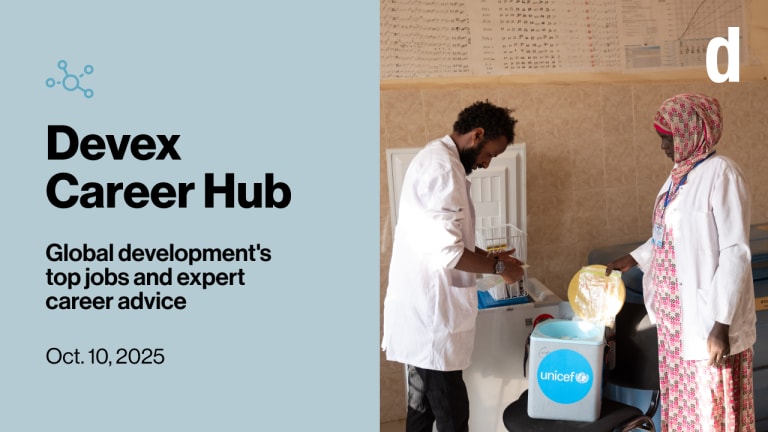
This week, I spoke with recruiters from RTI International who will be attending Devex’s 6th Annual International Development Career Forum in Washington, D.C. to share tips and advice for professionals planning to attend the event this Friday, March 28.
They shared great insights on how to format your CV (Hint: max five pages if you are a technical specialist, max three pages if you are more of an operations/finance/administration specialist), what to put on your business card (Hint: Don’t use one from a former employer and be sure to brand yourself as the expert you want to be) and how to deliver your pitch to a prospective employer (Hint: a couple of sentences summing up your two to three areas of expertise and regional focus if applicable).
For more advice on how to prepare for a career fair, check out “How to ace an international development career fair.”
But what about those rookie mistakes you want to make sure to avoid? Here are five things you shouldn’t do at the career forum – or any career networking event – and what you should do instead.
1. Don’t ask a recruiter: What does your organization do? What are your current job openings?
Instead, do your research beforehand. Check out the list of exhibitors, review their website and current job openings and if you have a career account with Devex, check out their career profile in our directory of organizations. Know the sectors, regions and donors they work with and how your skills and experience fits in. If there is a job you are interested in, prepare your 30-second pitch on why you are a strong candidate. If you ask basic questions about the organization, chances are the recruiter will just refer you to the website. You’re attending this event to get information that you can’t find on a website, so take advantage of it.
2. Don’t just pay attention to the recruiters
Recruiters will be present, but many organizations also bring a diverse team of professionals from their office, including program managers and technical and business development associates. The latter are often able to provide insights and details about their day-to-day work as well as forecasts of future hiring needs that a recruiter isn’t always best suited to provide. Some of them may be future decision-makers on new hires, so making a good impression with them is just as important.
3. Don’t view the other job seekers as competition
Sure, there could be a scenario where you and someone else at the event may be up for the same job. However, chances are the other professionals in the room are more likely to be an asset than a hindrance to your career aspirations. Because Devex screens candidates for the career forums, the room is filled with experienced and accomplished professionals, each with their own established networks and insights into the industry.
Take advantage of this opportunity to build upon your own network. Strike up a conversation with fellow job seekers while waiting in line to speak with an organization. Catch up with old colleagues by the water station when you need a break. During the networking reception, share your tips, advice and insights with the fellow professionals around you.
Every year we hear great anecdotes after our career events from professionals who made valuable connections with other job seekers that led them to a job or business opportunity. (No promises, but we’ve even had a few love connections, too).
4. Don’t hog a recruiter’s time
The recruiters are there to talk to you. They want to learn more about you. However, they also want to meet with the other candidates at the forum. While it might feel like the more time you get with the recruiter, the more likely they will be to remember you, you also want them to remember you as a stand-out candidate, not the one who took up all of their time. You want to come across as interested, and dragging on the conversation could make you seem more desperate than confident.
A good rule of thumb is two to five minutes maximum, but take the recruiter’s lead. If they are actively engaged and asking questions, keep on talking, but if they are trying to wrap up the conversation or shifting their gaze to the other job seekers, that’s your cue to move on.
5. Don’t bring an elaborate portfolio of your work
Every year we see professionals who have spent a lot of time and money preparing beautifully bounded portfolios of their work including CVs, letters of recommendation, certificates and publications. While these are all great documents to have when you are further in the recruitment process, a career event that’s focused on making initial introductions isn’t the best place to share them. Additionally, in this digital age, sharing too much information in hard copy form could make you appear out of touch with current hiring practices.
Instead, bring simple copies of your CV printed on either standard or resume paper, your choice. Recruiters often like to look at these while talking with you so they can quickly get acquainted with your background. Some will write notes on them and keep them in a stack to review later. Many will prefer you to send an electronic copy, so don’t be offended if they decline to keep the hard copy, and be sure to follow up with a digital one later.
What are the biggest mistakes you have made or seen at a career fair? Please leave your tips and advice as a comment below.








